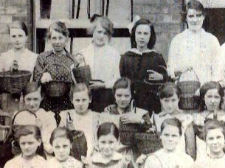Project Updates
Project: The Great Blackberry Pick
On 15, Mar 2016 | In Project Updates | By Nicola Gauld
The story so far…
By Julia Letts, Coordinator
The youngest participants of last Saturday’s Women’s History Network conference ‘Home, Food and Family in WW1’ were undoubtedly the children of Ombersley, Hindlip, Wychbold and Tibberton First Schools. Admittedly they weren’t there in person, but their work on the Great Blackberry Pick was displayed in the main conference hall and received many lovely compliments from the delegates. One retired teacher was overheard saying, ‘I wish I’d done a project like this when I was teaching’. High praise indeed!
The Great Blackberry Pick grew from an idea planted by a reception teacher, who’d been asked by her school to ‘do something on WW1’ for Key Stage 1 & 2 children. Wondering how to engage and explain the complexities of a world war to students aged 6, 7 and 8, she approached me for ideas. I conceive and coordinate projects with schools and community groups, and love using primary sources or oral history interviews as a starting point. In this case the catalyst was the Hindlip School log book which recorded classes blackberry picking for several weeks in the Autumn of 1918. “The total weight of fruit picked by the children for the Army and Navy is 14 cwts and 11 lbs for which they have been paid £20” declares the entry for October 18th. That’s a staggering 700 kilos. What would today’s children make of that?
This became the starting point of a very hands-on history project run by Droitwich Spa Library and supported by the Heritage Lottery Fund to engage very young children at four local schools. The students’ mission was to find out what it was like to be a child a hundred years ago. Each school designed their own project which was delivered in the autumn term of 2015.
At the WHN conference, I updated the delegates on the progress of the projects and related some of the more surprising outcomes from the Great Blackberry Pick. The first surprise was the discovery of how few of the children had ever been blackberry picking before. We took each class on a trip to a farm run by the Worcestershire Wildlife Trust where they learnt about hedgerows and picked blackberries. They also got wet, stung and prickled and loved every minute of it. Many of the children and their teachers were out of their comfort zone but the trips proved to be a perfect ‘WOW’ event (a new term I’ve learnt for an activity that starts off a topic and gets the children really inspired from the word go).
The four schools also ended their projects with ‘WOW’ events. Two of them hosted tea parties for relatives and local people, serving up home-made blackberry jam and cakes and showing off the many things they’d learnt about WW1 in Worcestershire. One school put on a Remembrance Day Assembly about the Home Front and one held a sale, making a wonderful array of items and raising money for a charity which sends Christmas boxes to serving soldiers. The knock-on effect of these events was that parents and grandparents got involved. They dug about in their attics and found their own family memorabilia; they did further research with their children and some even went blackberry picking and tried their hand at jam making.
In between the WOW events, a whole host of learning went on. The children handled WW1 artefacts and learnt about primary sources. They discovered what scrap books were and how to make them. They were shown how to blog about their experiences. They embroidered cards and bookmarks, made fruit dyes, cooked crumble and soup, recorded poems and made a radio programme. On November 11th they remembered the soldiers but also thought about all the other people who had made sacrifices during the war. What surprised their teachers was how easily they could cover all elements of the National Curriculum with this topic – citizenship, literacy, maths and science, ICT, art, design and technology, music, drama and dance. It would take a much longer document than this to describe the fantastic, innovative ways the teachers expanded on the simple concept of the Great Blackberry Pick.
The surprise for Droitwich Library was how productive the links with the four schools were. The members of staff who went into the schools became familiar faces to the children who then visited the library to say hello and look at their work displayed in the library windows. One young lad brought his dad into the library to look at the WW1 books; neither had ever been in the building before. The big challenge is keeping these links going. Will the schools run the project again next year without us holding their hands?
The hope is that this year’s Great Blackberry Pick can provide a blueprint for future schools. Over the next few months we’ll create all the resources that schools need to create their own projects on the role of children in WW1. Our best ideas, work sheets and templates will be uploaded to the Great Blackberry Pick website (https://thegreatblackberrypick.wordpress.com ) and we’ll put together a ‘Blackberry Kit’ – a box of resources that any school can borrow.
By the time we get round to the next blackberry season, we hope that many more schools in the area (and possibly across the country) will realise the potential of using an activity as simple as blackberry picking to kick start a much wider project about the role of children and families in WW1. They may not beat the Hindlip School total of 700 kilos of fruit picked in a few afternoons in 1918, but believe me, in terms of learning, it’s amazing what even a handful of blackberries can do!
For further details please contact James Robertson at Droitwich Spa Library 01905 822722
or Julia Letts, Project Coordinator on 01905 453023 or julia.letts@virgin.net



